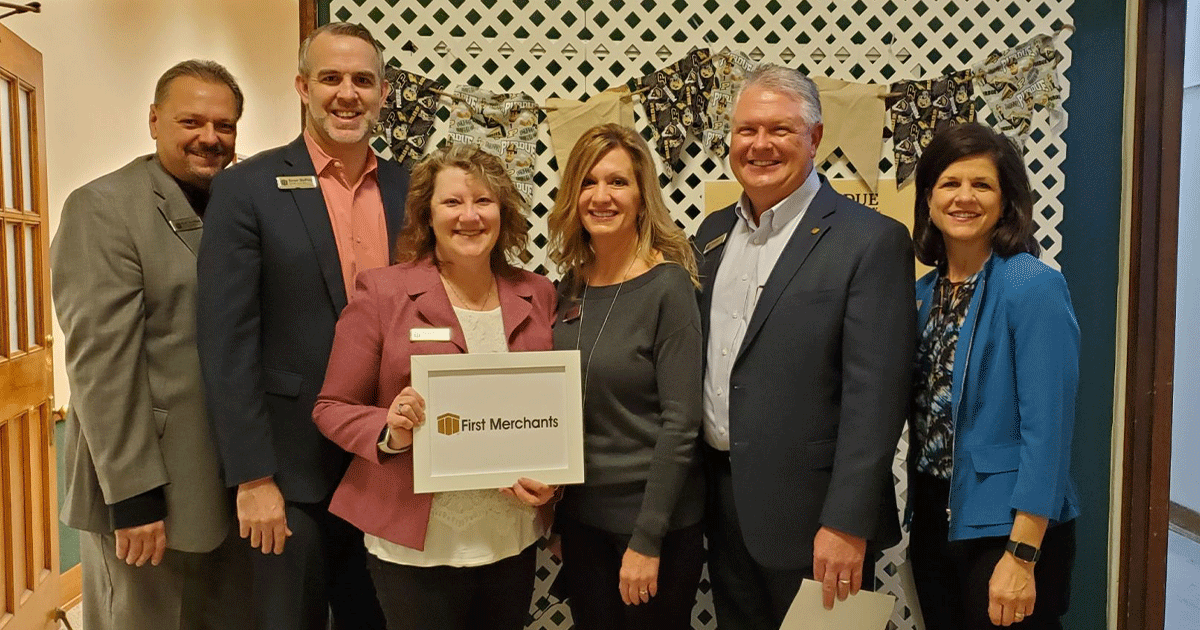
Thursday, June 30, 2022
All good salespeople got their start somewhere. Whether it was selling lemonade at a sidewalk stand, a first high school job, or practicing in a classroom, these hands-on experiences are foundational to helping young professionals thrive, grow, and learn. It’s something Mark Nettles, Regional Sales Manager with First Merchants Bank, knows from his long career of training welcoming, attentive bankers; and it’s something he tried to impress upon his own children as they worked their way through Purdue University’s Selling and Sales Management program.
“I would help them practice their skills for class by running a short roleplay with them at home,” Mark shared. “And after a bit of helping my children, I thought, ‘This program is teaching needs-based selling, which is what we preach and teach our bankers every day.’”
Mark saw an opportunity to help. So, he approached Purdue about a unique partnership, and Purdue was on board in a heartbeat.
“I think the program director said, ‘Can you come in in a couple of weeks?’” Mark recalled with a laugh. “They really love it, because a bank provides a service, not a product. And the experience helps prepare students for the workforce by giving them the skills they’ll need to become successful.”
As part of the lab, students are given a week to prepare and learn the ins and outs of First Merchants’ services, explained Christine Alfery, Director of Sales Strategy and Performance with First Merchants Bank. Then, the students are partnered with a banker – someone who does this work for a living – and presented with a scenario:
“David Jones arrived at your bank this morning and wants to open a checking account, go,” explained Christine.
The goal is for the students to strike up a conversation – to learn as much as they can about the person’s needs and to recommend services that will appropriately meet those needs.
Students always get the sale, Mark explained.
“They hate it – even in our banking centers. You say the word ‘roleplay’ and they start shaking in their boots,” he said with a laugh. “You have to make it as fair as possible and work to build their confidence.”
During the sale scenario, an observer takes notes and provides detailed, constructive feedback once time is up.
“We try to give them some nuggets of skills that they can use in the real world,” Christine said.
Since that first lab in August of 2021, the partnership has grown and is now a regular feature in the program. Mark says while the students initially wrinkle their noses at the idea of a roleplay scenario, they thrive on the feedback they receive from First Merchants.
“The feedback part is the most important bit – because that’s what our team does every day,” Mark said. “We bring sales coaches into the classroom because that’s what we do every day. And when you tell the students that I coach salespeople, their eyes just light up and they understand they’re getting real-world experience while they’re in college.”
“Those are the things that will stick with them for next time,” Christine added. “They’re always like, ‘I can’t believe you took time out of your day to come and do this with us.’”
And Christine and Mark are, in turn, impressed by the students.
“They do a beautiful job,” Christine said. “The amount of preparation and research they do and the passion they bring is impressive.”
Mark agreed.
“They’re as good as some of our bankers right now, and they’re still college students,” he joked.
It’s inspired both bankers, who say they’re working on creating internship opportunities they can offer to promising students moving forward.
For Christine, the experience highlights First Merchants’ commitment to investing in the communities it serves, and in the future.
“This is such a perfect way for us to come in and invest time in youth,” Christine shared. “And I think that’s impactful to them. To know that professionals gave up a day to come in and invest time in their growth and their development and provide them with concrete feedback that they can take and implement for the future. We’re investing in our young people, and we’re showing that it is vital, it is important to us to reach out to the next generation and share our knowledge and experience – because we all started where they are.”

